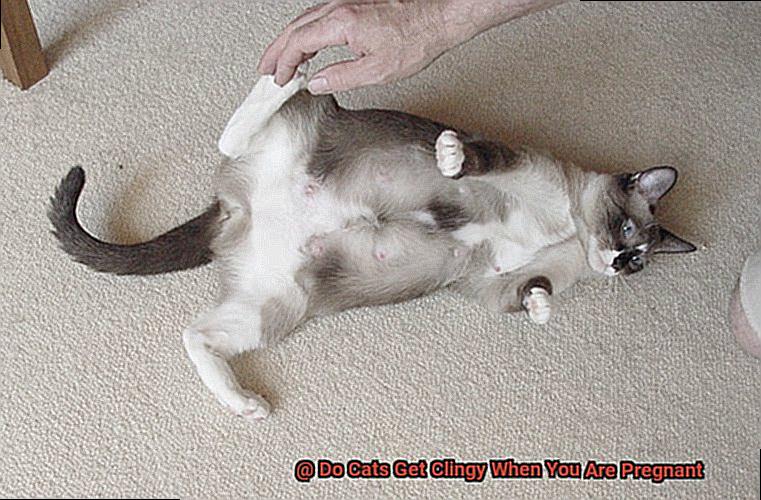Do cats get clingy when their owners are pregnant? Yes. Cats are incredibly sensitive creatures and can detect changes in their environment.
As a woman’s body undergoes physical and hormonal changes during pregnancy, her cat may become more protective and clingy.
Cats can also become more attached as they anticipate the arrival of a new family member, especially if they have been with their owners for a long time.
Cats adopted from shelters or rescues may also show increased attachment during pregnancy as they learn to trust their new home.
If your cat has become more clingy when you’re expecting, there are several things you can do to make both of you more comfortable.
Giving your cat lots of love and affection will help it feel secure while providing it with safe places to hide if it needs some alone time.
Introducing your cat to baby items before the baby’s arrival can also help reduce any anxiety or stress it may be experiencing about the forthcoming change in its life.
So don’t worry if your furry friend appears more attached when you’re pregnant – this is normal. With just a little bit of knowledge and patience, you’ll both be able to adjust to the latest addition with ease.
Cats and Their Sensitive Nature
Cats are truly remarkable creatures.
With their heightened senses, they have the incredible ability to sense changes in their environment and often pick up on the moods of their owners.
It’s almost as if they have a sixth sense that helps them detect even the subtlest shifts in the atmosphere.
Take pregnancy, for instance.
Cats can often tell when their owners are expecting before she even knows it herself. This is due to the hormonal changes that occur in a woman’s body at this time, which cats can easily detect.
As a result, cats may become more affectionate and clingy as they offer support during this period of transition.
They may also be more protective of her throughout her pregnancy, doing whatever it takes to ensure her safety.
It’s almost like cats have an invisible antenna that helps them sense the tiniest changes in their environment – much like a radio receiving signals from far away.
Their senses – sight, hearing, and touch – help them detect any signs of danger or change and react accordingly.
Can Cats Sense Pregnancy?
Have you ever wondered if cats can sense when a woman is pregnant? It may seem like an odd question, but there is evidence that suggests cats may have the ability to detect pregnancy before it is known.
Cats have heightened senses of smell and hearing, which may enable them to detect subtle changes in hormone levels that occur during pregnancy.
According to some experts, cats can detect these changes, so they may be able to tell when a woman is expecting.
If your cat seems to be behaving differently, it could indicate that they are aware of your pregnancy.
For instance, they may become more affectionate or purr more often than normal.
They may also be seeking out the mother-to-be more frequently.
It’s important for pregnant women to monitor their cats for any changes in their behavior and take note of any signs that their cat might be aware of the pregnancy.
It’s almost as if cats possess a magical sixth sense when it comes to detecting pregnancy.
How Do Cats React to a Pregnant Owner?
Cats are incredibly perceptive creatures, and can often detect the hormonal shifts that come with pregnancy.
As a result, cats may become more clingy and affectionate toward their pregnant owners as they search for a sense of security during this unpredictable time.
This can be seen in their protective behavior towards their owners, as well as signs of anxiety or fear due to the increased activity in the home or strangers coming into the house.
Cats may also try to comfort their owners by purring, kneading, or sleeping near them more often than usual.
Pregnant owners need to be aware of how their cats are reacting to these changes and provide extra love and reassurance if necessary.
Is It Common for Cats to Get Clingy When You Are Pregnant?
Cats are naturally intuitive creatures, and pregnancy can bring about a lot of change for both cats and humans alike.
So, is it common for cats to become clingy when their owners are pregnant? The answer is a definite yes. Cats are known to pick up on changes in their environment, such as the hormone changes that occur when a woman is pregnant.
As a result, cats may become more affectionate and clingy towards their pregnant parents.

This behavior may manifest itself in many different ways.
Your cat might purr more often or follow you around the house more than usual.
During this special time, they may also knead your stomach or lick your belly in an attempt to show their love and care.
Sleeping near the mother’s stomach or rubbing against her legs are two other common behaviors.
Though these habits may seem strange at first, it’s important to remember that they are normal for cats.
The Benefits of Having a Cat During Pregnancy
Having a cat during pregnancy can be incredibly beneficial for both mother and baby.
Not only does it bring a calming, soothing presence into the home, but cats are also known for their ability to reduce stress and anxiety.
They provide companionship and help to reduce feelings of loneliness, as well as encourage pregnant women to stay active by playing and exercising with them.
Studies have shown that having a cat around can even improve a pregnant woman’s overall health by lowering blood pressure levels and assisting them in sleeping better.
It’s almost as if cats know when they need them most.

They offer emotional support with their gentle purrs and delicate head rubs, just when you need it most.
A cat is like your very own faithful companion – always available for you in times of joy or sadness – a true friend who will never leave your side.
So why not give the gift of love during the holiday season?
Tips For Keeping Your Cat Calm During Pregnancy
Pregnancy can be a time of great joy, but it can also be stressful for both humans and cats.
To ensure everyone in the family is relaxed and happy during this transition period, here are seven tips for keeping your cat calm during pregnancy.
Provide your cat with a safe and comfortable environment – Create a cozy space for your cat to retreat to if they feel overwhelmed or anxious.
Make sure there are plenty of blankets, toys, scratching posts, and other items that will make them feel secure in their environment.
Spend time with your cat
Take some time each day to play with your cat, pet them, and give them extra love and attention.
This will help them feel secure that things are still the same despite any changes in the household due to pregnancy.
Stick to a routine
Cats thrive on routine, so try to keep their daily schedule as consistent as possible.
Feed them at the same time each day, provide ample playtime, and make sure they have access to their litter box when needed.
Be mindful of changes in behavior
Monitor your cat’s behavior for any changes that may indicate stress or anxiety.
If you notice any signs of distress, take steps to address it as soon as possible before it becomes an issue.
Consider using calming products
There are various products on the market designed to help cats stay calm during stressful situations such as pregnancy.
These can include sprays, diffusers, or even treats infused with calming ingredients such as chamomile and valerian root extract which may help keep your feline friend relaxed during this period of transition.
Talk to your vet
If you’re concerned about how your cat is coping with pregnancy, talk to your vet for advice on how best to manage their behavior during this time so everyone in the family can enjoy a happy home environment together.
What To Do If Your Cat Becomes Aggressive During Pregnancy
Understand the Causes of Aggression
During pregnancy, cats can become aggressive due to hormonal changes, fear of the unknown, and territorial behavior.
Hormonal changes can cause cats to become more irritable and fearful, making them more likely to lash out. Cats may also become aggressive if they feel threatened or are unfamiliar with their surroundings.
Pregnant cats may also become more territorial and protective of their space, leading to aggression. It is important to understand the cause of your cat’s aggression to find the best way to handle it.
Create a Safe Environment
Creating a safe environment for your cat is key to calming them down during pregnancy. Make sure that your cat has access to a quiet area away from any potential stressors such as loud noises or unfamiliar people.
Provide plenty of toys and scratching posts for them to play with and keep their litter box clean. Additionally, make sure that your cat has access to food and water at all times.
Use Positive Reinforcement
Positive reinforcement is an effective way to encourage good behavior in cats. When your cat displays appropriate behavior, reward them with treats or verbal praise.
This will help them understand that the desired behavior is rewarded and will encourage them to continue exhibiting it.
Additionally, avoid punishing your cat for aggressive behavior as this can make them more fearful and lead to further aggression.
Seek Professional Help
If your cat’s aggression becomes unmanageable or you are unable to control it yourself, it is important to seek professional help.
A veterinarian or animal behaviorist can provide you with advice on how best to handle your cat’s aggression during pregnancy.
They may also be able to prescribe medication or suggest other treatments that can help calm your cat down.
Conclusion
Pregnancy is a special time for both humans and cats alike.
Cats are sensitive creatures who can detect changes in their environment, such as the hormonal shifts that occur during pregnancy.
As a result, cats may become more clingy and affectionate toward their pregnant owners to find stability in an uncertain time.
However, it’s important to be aware of potential signs of aggression in cats during pregnancy.
Hissing, growling, swatting with paws, and baring teeth are all warning signs that should be addressed immediately.
Providing a safe space away from the pregnant woman and other animals; positive reinforcement education; and avoiding sudden changes in routine or environment can help keep your cat calm during this special time.
Overall, having a cat around during pregnancy can be incredibly beneficial for both mother and baby.
Not only do they bring a calming presence into the home, but cats are also known for their ability to reduce stress and anxiety.







